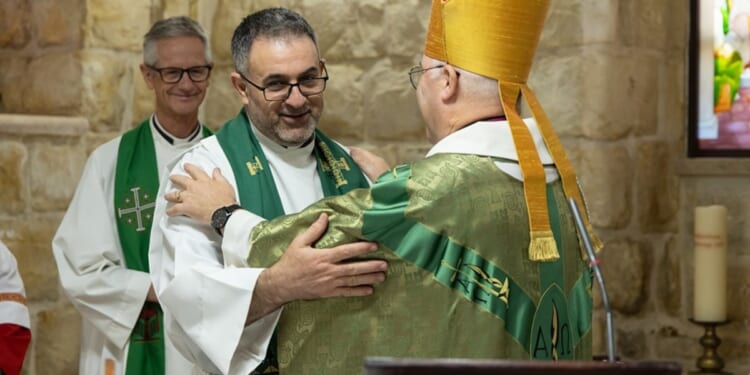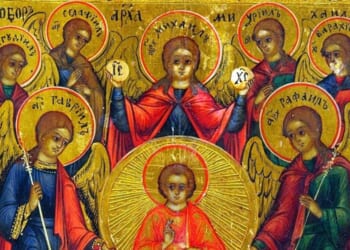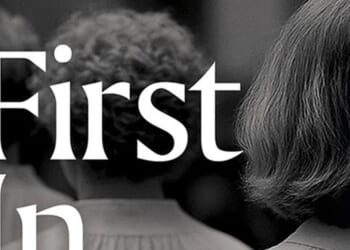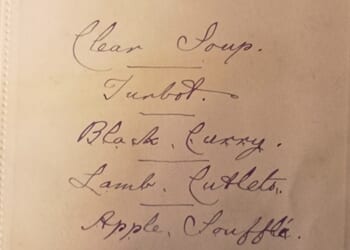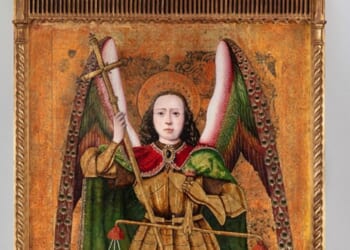“WE ARE here to be alongside you; we are here to show solidarity with you,” the Archbishop of York told the congregation at St Andrew’s, Ramallah, in the West Bank, on Sunday.
Archbishop Cottrell began his sermon with an apology for the Church of England’s initial response to the bombardment of Gaza, and the escalation of hostilities in the West Bank, which followed the 7 October Hamas attacks on southern Israel.
In October 2023, a group of parishioners at St Andrew’s wrote to the then Archbishop of Canterbury, criticising his public statements in the wake of the 7 October attacks, and suggesting that “our voices as Palestinian Anglicans are not being heard in Canterbury and our interests are being relegated” (News, 27 October 2023).
“We are sorry that we were slow to raise our voice in support of Palestine and the Palestinian people,” Archbishop Cottrell said on Sunday. “But we’re here to listen to you, to learn from you, and then we will tell these stories when we get home.”
He heard some of those stories over the course of meetings with members of the congregation on Sunday afternoon, as part of a five-day “pilgrimage of prayer and solidarity” to Israel and Palestine.
Perhaps the most affecting contribution came from a group of women from the parish. Arda Shamshoum read a letter in which they thanked Archbishop Cottrell for his strongly worded statement in July (News, 24 July), and called on him, and the Church, to go further.
“Today, we ask you to listen not only to us but to your own conscience, and to the truth echoing through the cries of humanity,” she said.
“Since the time of our Lord Jesus Christ, we — Palestinian women — have lived under empire and oppression . . . Our ancestors endured Roman occupation, poverty, and marginalisation, yet remained steadfast in faith.”
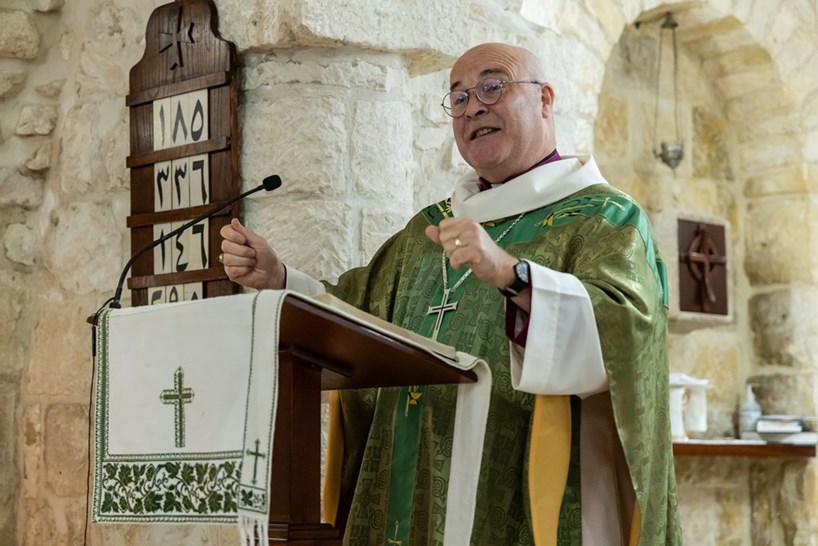 ANDREA KROGMANN/OFFICE OF THE ARCHBISHOP OF YORKThe Archbishop of York preaches at St Andrew’s, Ramallah
ANDREA KROGMANN/OFFICE OF THE ARCHBISHOP OF YORKThe Archbishop of York preaches at St Andrew’s, Ramallah
In “reliving the stories of our great-grandmothers”, the women were “rewriting our own through the Holy Spirit”, Ms Shamshoum said. “We are sanctified when we endure collective punishment simply for being Palestinian, recalling the blind man of John 9, of whom Jesus said, ‘Neither this man nor his parents sinned, but this happened so that the works of God might be displayed in him.’”
The letter called on the Church to “recognise its responsibility in enabling the injustice brought upon us, often by so-called ‘Christian Zionists’”, and to make a commitment to “repentance and action”.
The movement to boycott, divest from, and sanction, Israel, was the “most ethical” approach to take”, the letter suggested. It also made a case for the adoption of a memorial day for those killed in Gaza and across Palestine.
The meeting took place in the church hall of St Andrew’s, at tables laid with cups of water and boxes of tissues. When Ms Shamshoum finished speaking, a tearful Archbishop Cottrell asked if he could embrace her. He took a copy of the letter, and assured her that the words of the group would be heard.
Ms Shamshoum apologised for making him — and Mrs Cottrell — cry. “Tears are prayers,” Archbishop Cottrell replied. “They are a sign that our hearts have been touched. So please don’t apologise. I am thanking God that you have brought us here.”
“WHAT were Jesus’s first words on the first Easter Day?” Archbishop Cottrell had asked in his sermon. The answer, according to St John’s Gospel, is the question that Jesus asked Mary Magdalene when he encountered her outside the tomb: “Why are you weeping?”
“I think it’s so beautiful that the first thing that Jesus says on the first Easter Day is he reaches out to our sorrow,” Archbishop Cottrell said.
“We are here to say to you: tell us why you are weeping, tell us your sorrows. Because we wish to be alongside you. We see Jesus in you, and your faith gives us great heart.”
At the end of the service, the Vicar of St Andrew’s, Fr Fadi Diab, said that he was “deeply grateful” that the Archbishop had come to Ramallah “to listen, to share in our sorrow, to ask why we are weeping, because we have been weeping for too long”.
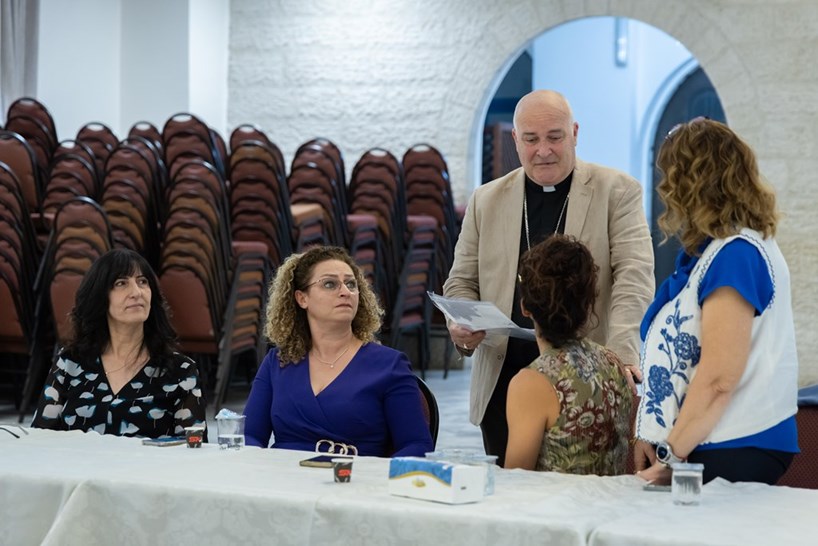 ANDREA KROGMANN/OFFICE OF THE ARCHBISHOP OF YORKANDREA KROGMANN/OFFICE OF THE ARCHBISHOP OF YORK
ANDREA KROGMANN/OFFICE OF THE ARCHBISHOP OF YORKANDREA KROGMANN/OFFICE OF THE ARCHBISHOP OF YORK
One of the reasons that they had been weeping, he said, was because the Church “was away” and “never asked ‘Why are you weeping?’”
After the service, the political analyst Xavier Abu Eid told the Archbishop that he had been moved by the sermon, and the apology he had offered. What was needed now was for the Church to take action, he said, and to speak without fear — ideas that he articulated in an article for the Church Times earlier this year (Comment, 26 September).
A Lutheran pastor, Dr Munther Isaac, who has recently moved from a church in Bethlehem to Ramallah, also urged the Church to act more decisively. “The global Church is not doing enough,” he said. “We want the Church to help us dismantle the structures of oppression.”
The term “genocide” was an accurate description, he said, and not anti-Semitic. “It is time to call things exactly as they are.”
Archbishop Welby’s decision not to meet Dr Isaac in 2024 was strongly criticised by advocates of the Palestinian cause, and the Archbishop later met, and apologised to, Dr Isaac (News, 29 February 2024).
It would be no use, Dr Isaac said on Sunday, if, in five years’ time, another Archbishop was sitting here praising the Palestinian people for their resilience. “Palestinians are tired of telling their story,” he said: what they needed was action.
The Christian population in the region was declining at a rapid rate, he said: he warned that, one day, “you will be here to visit the holy sites only.”
But there was no specific solution to maintaining the Christian population in the Holy Land, he said, because the main reason they were leaving was the intolerable conditions created by the occupation.
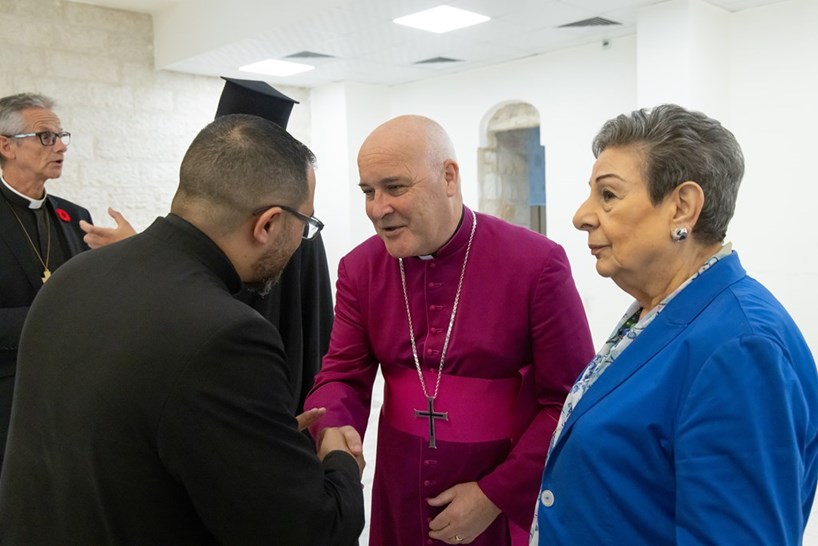 ANDREA KROGMANN/OFFICE OF THE ARCHBISHOP OF YORKANDREA KROGMANN/OFFICE OF THE ARCHBISHOP OF YORK
ANDREA KROGMANN/OFFICE OF THE ARCHBISHOP OF YORKANDREA KROGMANN/OFFICE OF THE ARCHBISHOP OF YORK
A former member of the executive committee of the Palestine Liberation Organization (PLO), Dr Hanan Ashwari, agreed that the situation facing Christians was dire. They faced persecution and erasure, she said. “But we are descendants of the oldest Christians in the world, so how dare they tell us we don’t exist?”
“I do admire your resilience, but I don’t want you to have to be resilient,” Archbishop Cottrell told the gathering. He referred to his experience in the south Hebron hills the previous day, where the Church of England delegation had been harassed by armed settlers and moved on by the Israeli police (News, 8 November).
“We had the tiniest glimpse of the horror, the injustice, that you’re living with, and it awakens in me a renewed determination to do what I can, to stand alongside you and to use my voice and influence as best I can,” he said.
During the service, a new-born girl, Tina, was brought to the front of the church for a blessing. Afterwards, Archbishop Cottrell said: “It’s been so moving to welcome little Tina to church for the first time, but we want Tina, and all the children of Palestine, to grow up and be able to flourish.”

